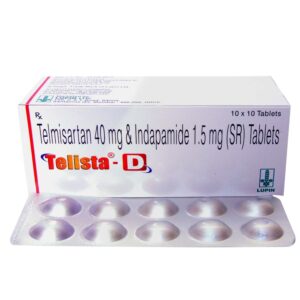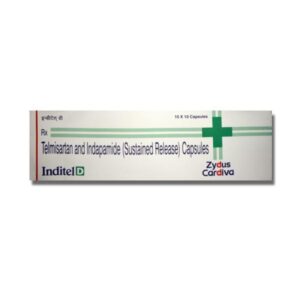INDAPAMIDE + TELMISARTAN
Indapamide: Indapamide is a medication primarily used to treat high blood pressure (hypertension). It belongs to a class of drugs called diuretics, specifically thiazide-like diuretics.
The main mechanism of action of Indapamide is to increase the excretion of water and salt from the body, thereby reducing fluid buildup and decreasing blood pressure. It achieves this by inhibiting the reabsorption of sodium and chloride ions in the kidneys, which results in increased urine production. Indapamide also has some vasodilatory effects, helping to relax and widen blood vessels.
The usual starting dose of Indapamide is 1.25 milligrams (mg) once a day. This can be increased to a maximum dose of 5 mg per day, depending on the individual patient’s response. It is usually taken in the morning with or without food.
As with any medication, Indapamide can cause side effects. Some common side effects include dizziness, headache, weakness, nausea, dry mouth, constipation, and low blood pressure. It may also lead to electrolyte imbalances, such as low levels of potassium, sodium, and magnesium, which can cause muscle weakness or irregular heart rhythms. It is important to monitor these electrolyte levels regularly while taking Indapamide. If you experience severe side effects or any signs of an allergic reaction (e.g., swelling, rash, difficulty breathing), seek immediate medical attention.
Indapamide may interact with certain medications, so it is essential to inform your healthcare provider about all the drugs you are taking, including over-the-counter medications and herbal supplements, before starting Indapamide.
It is important to note that Indapamide should not be used during pregnancy or while breastfeeding, as its safety in these situations has not been well-established. Talk to your healthcare provider for further guidance and to determine if this medication is appropriate for you.
Telmisartan: Telmisartan is a medication classified as an angiotensin II receptor antagonist. It is primarily used to treat high blood pressure (hypertension) and reduce the risk of cardiovascular events, such as heart attack and stroke, in patients with established cardiovascular disease.
The drug works by blocking the action of angiotensin II, a substance that narrows blood vessels and increases blood pressure. By inhibiting this action, Telmisartan helps relax and widen the blood vessels, leading to a decrease in blood pressure.
The usual starting dose of Telmisartan for hypertension is 40 mg once daily, which can be increased to a maximum dose of 80 mg once daily if needed. It can be taken with or without food.
Like most medications, Telmisartan may cause side effects. Some common side effects include headache, dizziness, fatigue, cough, and diarrhea. However, these side effects are typically mild and resolve on their own. Rare but serious side effects may include allergic reactions, kidney problems, and liver impairment. It is important to inform your healthcare provider if you experience any unusual or severe side effects while taking Telmisartan.
It is worth noting that Telmisartan should not be used during pregnancy as it may cause harm to the developing fetus. It is also contraindicated in patients with a history of angioedema (swelling of the face, lips, tongue, or throat) related to previous angiotensin II receptor antagonist therapy.
As always, it is crucial to follow the recommended dosage and consult with a healthcare professional before starting or making any changes to your medication regimen.


